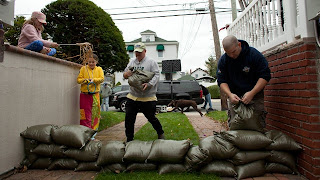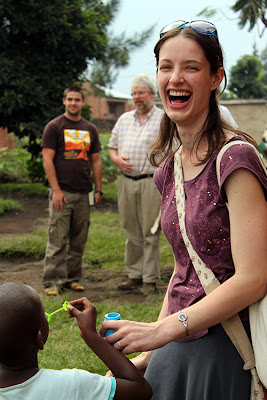 I was away in Houston this weekend as
it became increasingly clear that a storm developing in the Atlantic
would impact my home community in Washington, DC - not to mention
virtually the entire northeastern seaboard! As more information came
in, predictions grew increasingly dire. I began to receive a steady
stream of emails and phone calls from my mother in Wichita. Her
anxiety was coming to a boil as she sat for hours, watching the
Weather Channel. She wanted to know: Were we getting ready? Did we
have batteries? Bottled water? Had we topped off the car's gas tank?
I was away in Houston this weekend as
it became increasingly clear that a storm developing in the Atlantic
would impact my home community in Washington, DC - not to mention
virtually the entire northeastern seaboard! As more information came
in, predictions grew increasingly dire. I began to receive a steady
stream of emails and phone calls from my mother in Wichita. Her
anxiety was coming to a boil as she sat for hours, watching the
Weather Channel. She wanted to know: Were we getting ready? Did we
have batteries? Bottled water? Had we topped off the car's gas tank?
Of course, I was a thousand miles away
out in Texas, so what could I do? Nothing but worry. Faith was still
back home, so she spent her weekend running around town, collecting
supplies, filling gas tanks, and biting her fingernails. By the time
my flight touched down at National, we were both a bit of wreck.
I have never worried about a storm like
this. But, then, I have never been a homeowner in the path of a
hurricane before. Add to all this that our house has some serious
drainage issues that we have been trying to resolve for the last
several months, but which still require some serious work. A perfect
storm for anxiety.
As I write this, the long-awaited
weather is just beginning to arrive. Rain has begun to fall, and the
sump pump is running once every few minutes. The streets near our
house have been transformed into creeks, with gentle waves flowing
down into the nearby thoroughfare. I suspect that these waves will
not stay gentle for too much longer. I am praying that the
electricity will stay on, that the basement will not flood, and that
no trees will fall on our house or car.
I am also reminded of those who live
along coastal areas - particularly in southern New Jersey - many of
whom are being forced to evacuate ahead of the storm. My worries are
pretty minor compared to the immanent threat to life and property
that they are facing. So what if our basement floods and we lose
power for a week? We will still likely have our home, more or less
intact, at the end of the day.
Yet, whether our home is destroyed or
left in one piece; whether we are comfortable throughout the storm or
plunged into darkness and wet and cold; regardless of what happens to
us in the coming days, I believe that we are being given an
opportunity to trust in God's loving care and sovereignty.
The uncontrollable strength of this
storm serves as a reminder to me that the whole earth belongs to the
Lord. I cannot exempt my house, property, or even my life, from God's
disposal. The truth is, I own nothing. The more I attempt to cling to
the human fiction of ownership, the more desperately I seek to
control a world that I have neither the right nor ability to govern.
For me, this hurricane is an
opportunity to trust in the
sovereign God who speaks out of the whirlwind. This unstoppable
force of nature is a sign to me that no matter what human
contrivances we may develop to create an illusion of self-sufficiency
and control, we are profoundly at the mercy of a wild universe that
is created and sustained by a fearsome and mighty God.
This is terrifying. It is also
liberating. When I accept that God is truly in control, I can let go.
I can relax into humble acceptance and trust in the ultimate
resolution of all things. I am free to perform the work that the Lord
has given me to do. I am empowered to love those whom the Spirit has
commended to my care. And I can rest, leaving the results in God's
hands.
When my focus shifts away from myself
and onto Christ, I encounter true yieldedness and peace. I turn away
from those things that I insist must happen, the demands that I make
of God, as if I could dictate terms to the Creator! Instead, I am
drawn into the truth, life and power that is being revealed
by the indwelling Word. Releasing my need to control outcomes, I
am brought into the
easy yoke of Christ.
Let the words of the old hymn be my
prayer today, and always:
When peace like a river, attendeth
my way,
When sorrows like sea billows roll;
Whatever my lot, Thou hast taught me
to say,
It is well, it is well, with my
soul.









































